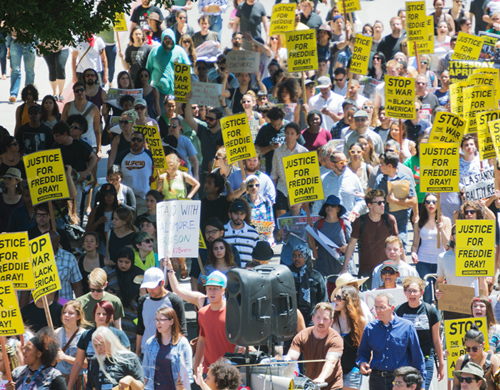Why Baltimore?
The tragic events of recent weeks could have happened in any big city in America. Rough treatment of minorities by police is hardly unique to Baltimore. Serious injuries and deaths are an all-too-common result. This is not to disparage individual law enforcement officers, who have to negotiate a complex and often hostile set of relationships that are not of their making. But again, this is not unique to Baltimore. After Ferguson, and New York, and North Charleston, a spark was bound to ignite somewhere, and that place happened to be Baltimore.
I have lived in Baltimore for more than 40 years. My wife and I have raised three children adopted from South America. One of them identifies himself as black. For years, he has told us stories of police harassment, being pulled over for "driving while black," and being suspected of crimes he could not have committed. This is reality. I do not think there is any parent of a black child who does not understand this to be true, and who does not fear that an innocent act, a taunting remark, or simply being in the wrong place at the wrong time could end up with real harm at the hands of the police.
But this reality exists in every big city. Why was Baltimore the flashpoint?
One reason, ironically, is that Baltimore has been getting better. A down-at-the-heels port city in the 1970s, it is now improving economically, socially, and physically. Also, almost the entire power structure of the city is African-American. This includes the mayor, police chief, state's attorney, and other leaders. An African-American middle class is growing rapidly but moving to the suburbs. Other middle-class people are moving into city neighborhoods and adding vitality and new businesses.
However, the people left in the inner city are not benefitting from all of this change. Many are unemployed or underemployed. Too many are dropouts or have such poor basic skills that they can only qualify for low-level jobs.
The anger and frustration of many Baltimoreans is understandable. They see people all around them, including people who look like them, entering the middle class. But from their point of view, the American dream remains unattainable.
My colleagues and I work in the schools that serve the very communities affected by the recent disturbances. The children who come to these schools start off bright-eyed and bushy-tailed, full of enthusiasm and confidence, like children everywhere. But then all too many of them experience failure. And all that motivation drains away. The majority of fourth graders read below the "basic" level on NAEP Reading. Poor reading skills make it almost impossible for children to grow up with confidence, graduate from high school, and go on to college or high-paying jobs.
None of this is surprising to any educator. But here is what should be infuriating: School failure is preventable. With every passing year we gain increasing evidence that virtually all children can learn to read and to succeed in other subjects. Using EDGAR standards, I count 28 elementary reading programs ready for use today that have at least moderate evidence of effectiveness. Yet none of these is used broadly enough to solve the reading problem in high-poverty schools. There is no reason that every Title I school in America should not be using proven programs.
The smoke rising over Baltimore in recent days is a signal to the whole country. Until we make opportunities available to all and treat everyone with respect and dignity, we can expect the frustrations of those who are shut out to boil over. Many things need to change, but one of the most fundamental is also among the easiest: Make sure that every child, whatever his or her background, learns to become a successful and confident reader. We know how to do it. Now let's do it.

